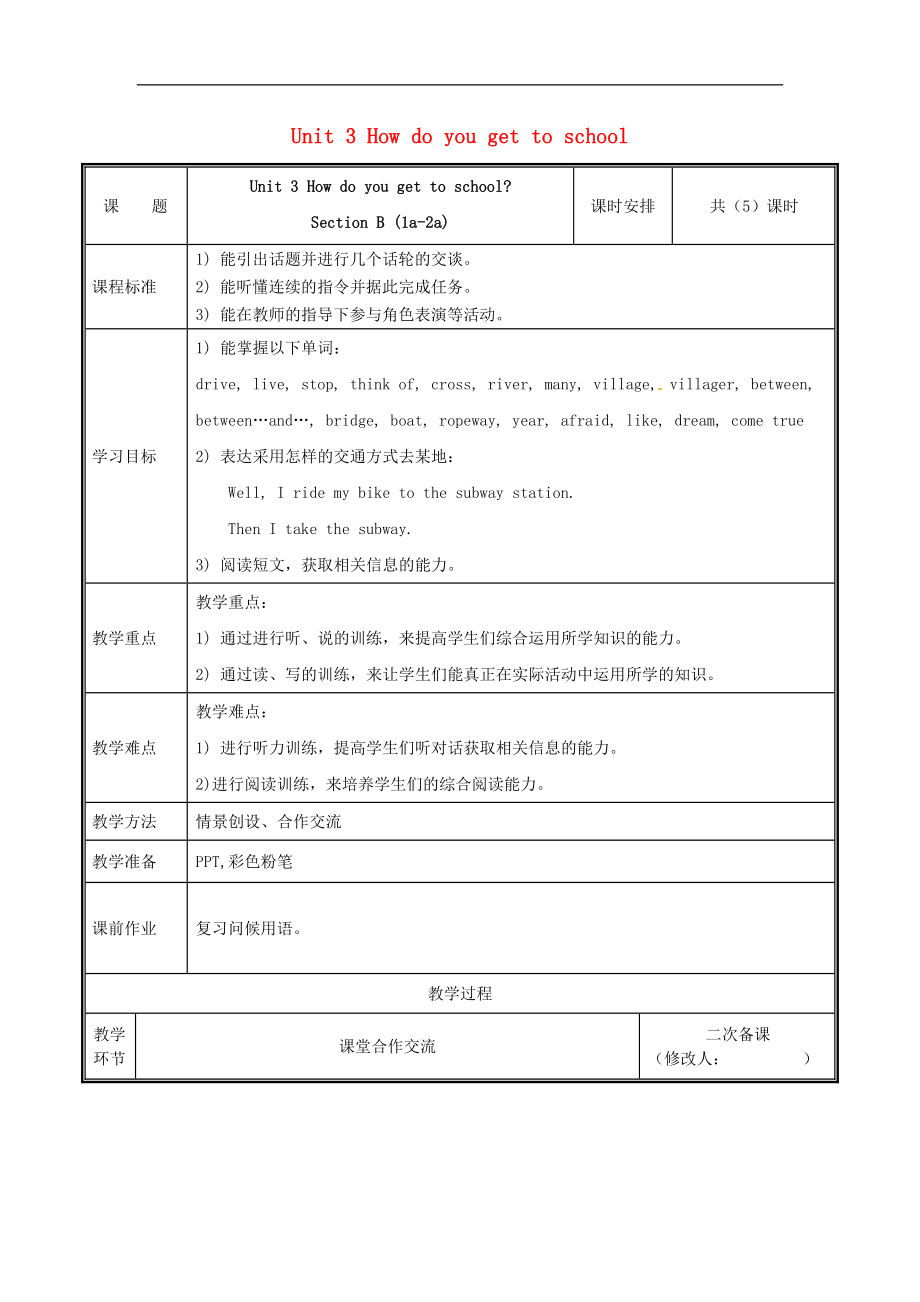《河南省鄭州市中牟縣雁鳴湖鎮(zhèn)七年級英語下冊 Unit 3 How do you get to school(第3課時(shí))教案 (新版)人教新目標(biāo)版》由會(huì)員分享���,可在線閱讀����,更多相關(guān)《河南省鄭州市中牟縣雁鳴湖鎮(zhèn)七年級英語下冊 Unit 3 How do you get to school(第3課時(shí))教案 (新版)人教新目標(biāo)版(4頁珍藏版)》請?jiān)谘b配圖網(wǎng)上搜索。
1����、
Unit 3 How do you get to school
課 題
Unit 3 How do you get to school?
Section B (1a-2a)
)
came?
Section A (1)
課時(shí)安排
共(5)課時(shí)
課程標(biāo)準(zhǔn)
1) 能引出話題并進(jìn)行幾個(gè)話輪的交談�。
2) 能聽懂連續(xù)的指令并據(jù)此完成任務(wù)。
3) 能在教師的指導(dǎo)下參與角色表演等活動(dòng)�。
學(xué)習(xí)目標(biāo)
1)
2、能掌握以下單詞:
drive, live, stop, think of, cross, river, many, village, villager, between, between…and…, bridge, boat, ropeway, year, afraid, like, dream, come true
2) 表達(dá)采用怎樣的交通方式去某地:
Well, I ride my bike to the subway station.
Then I take the subway.
3) 閱讀短文���,獲取相關(guān)信息的能力�。
教學(xué)重點(diǎn)
教學(xué)重點(diǎn):
1) 通過進(jìn)行聽、說的
3�、訓(xùn)練�����,來提高學(xué)生們綜合運(yùn)用所學(xué)知識的能力����。
2) 通過讀、寫的訓(xùn)練����,來讓學(xué)生們能真正在實(shí)際活動(dòng)中運(yùn)用所學(xué)的知識。
教學(xué)難點(diǎn)
教學(xué)難點(diǎn):
1) 進(jìn)行聽力訓(xùn)練���,提高學(xué)生們聽對話獲取相關(guān)信息的能力�����。
2)進(jìn)行閱讀訓(xùn)練�����,來培養(yǎng)學(xué)生們的綜合閱讀能力����。
教學(xué)方法
情景創(chuàng)設(shè)����、合作交流
教學(xué)準(zhǔn)備
PPT,彩色粉筆
課前作業(yè)
復(fù)習(xí)問候用語。
教學(xué)過程
教學(xué)環(huán)節(jié)
課堂合作交流
二次備課
(修改人: )
環(huán)
節(jié) 一
Step 1 Warming- up and revision
1. Greet Ss as usual.
2. Check the hom
4�����、ework.
Step 2 Presentation
1. 我們來認(rèn)識幾個(gè)新單詞���。I'll show you some pictures on the screen. Let's learn some new words. (在屏幕上展示p16頁的圖片)
2. Ss read and try to remember the new words and expressions.
Step 3 Match
T: 1. Let's open our books at page 16, point out the blank line in front of each number
5����、ed phrase. Ask Ss to match each phrase with a picture by writing the letter of the picture in the bank in front of the correct word. One has done for students.
2. Check the answers.
環(huán)
節(jié)
二
Step 4 Pairwork
1. First ask two students to read the dialogue to the class.
Sa: How do y
6、ou get to school?
Sb: Well, I ride my bike to the subway station. Then I take the subway.
2. Suppose you use two kinds of transportation to get to school. Tell your partner how you get ot school.
3. Ss practice the conversations in pairs.
4. Let some pairs to act out their conversations.
7����、Step 5 Listening
1c: 1. Ask different Ss to read each line to the class
2. Play the tape for the Ss to listen and check the things Mary wants to know.
3. Get Ss finish the listening task then check the answers.
1d: 1. Listen again. How does Bob get to his grandparents' home? Check 1 or 2.
8、2. Play the tape twice for the Ss to listen and check.
3. Check the answers.
Step 6 Talking
1. Let students tell how Bob gets to his grandparents' home. Ask students to use the pictures in 1d. And write these sentences on the blackboard.
2. Ss work with their partners. Try to say how Bob get t
9�����、o his grandparent's home.
3. Check the answers:
Step 7 Guess
1. Look at the picture and title below. Guess what the passage is about.
T: I think it's about how some students get to school. What do you think?
S1: I think it's about how some students in the village get to school.
S2: I th
10、ink it's about how some students in the mountain get to school.
Step 8 Reading
1. Fast reading
Read the passage and find the answer to this question:
What's the students' and the villagers' dream in this village?
2. Careful reading
Read the passage again and find the answers to the
11���、questions below:
1. How do the students in the village go to school?
2. Why do they go to school like this?
3. Does the boy like his school? Why?
4. What is the villager's dream? Do you think their dream can come true?
Ss read the passage again and try to find the answers to the questions.
12�、
Check the answers with the class.
Step 9 Reading
1. Let's work on 2a. Let's read the passage again and complete the sentences with the words from the passage.
2. Check the answers:
difficult, big, quickly, afraid, true
課中作業(yè)1c
Step 10 Homework
1. Remember the new words and expressions in this period.
2. Ask Ss try to retell the passage after class.
(修改人: )
板書設(shè)計(jì):
Section B1 (1a-2a)
Well, I ride my bike to the subway station.
Then I take the subway.
First he … Next he… Then he… Finally…
教學(xué)反思:
 河南省鄭州市中牟縣雁鳴湖鎮(zhèn)七年級英語下冊 Unit 3 How do you get to school(第3課時(shí))教案 (新版)人教新目標(biāo)版
河南省鄭州市中牟縣雁鳴湖鎮(zhèn)七年級英語下冊 Unit 3 How do you get to school(第3課時(shí))教案 (新版)人教新目標(biāo)版

